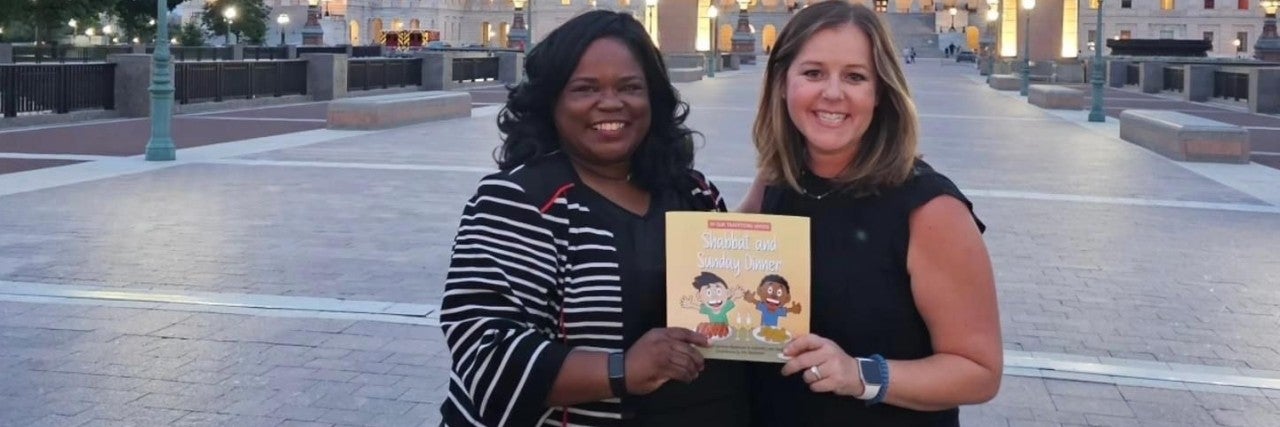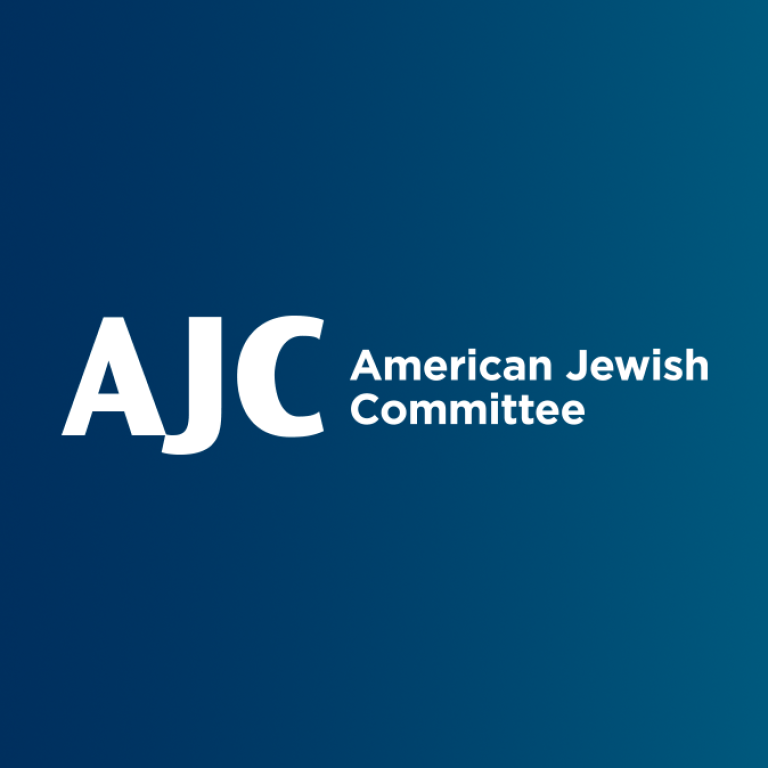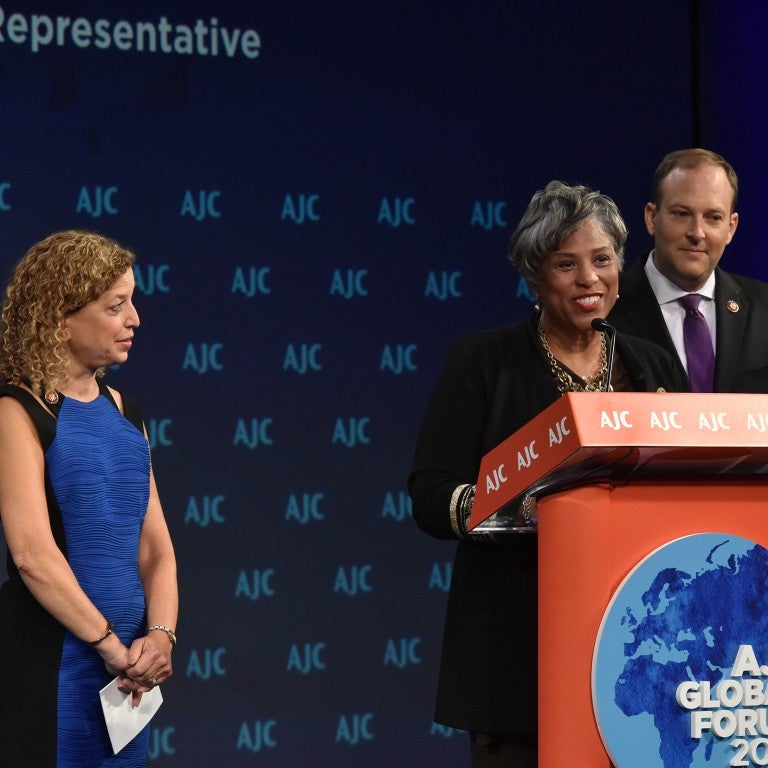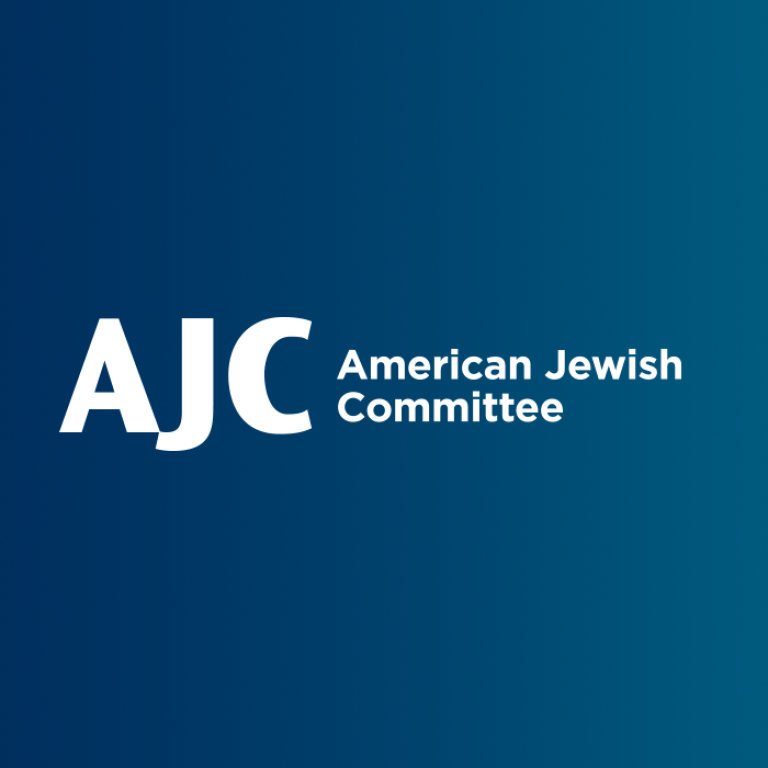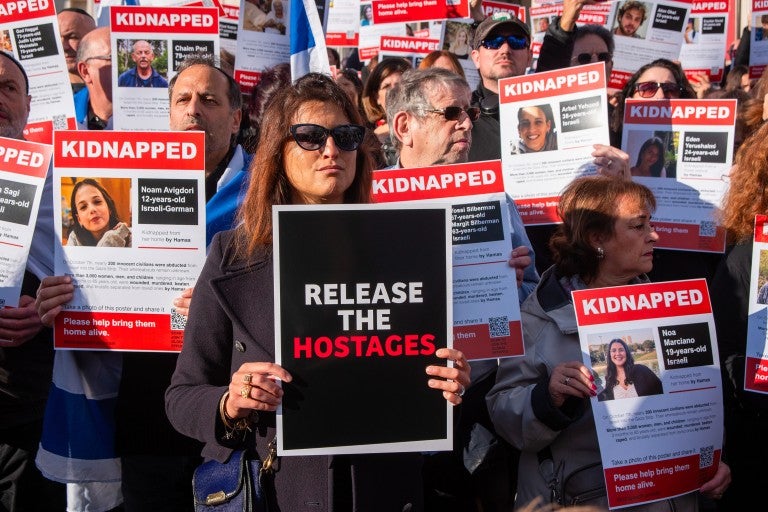July 13, 2023
Candace Bazemore and Gabby Leon Spatt, authors of the award-winning children’s book Shabbat and Sunday Dinner, traveled to Washington, D.C., this week to help AJC, the National Urban League, and ADL relaunch the bipartisan Congressional Caucus on Black-Jewish Relations. Together with Dov Wilker, AJC’s Director of Black-Jewish Relations, they discuss what can be accomplished through building stronger bridges between the Black and Jewish communities and how our diversity is a source of connection, not division.
More on the authors: Bazemore and Leon Spatt are members of AJC Atlanta’s Black/Jewish Coalition. They are also participants of AJC’s Project Understanding, which is a signature achievement of the coalition.
*The views and opinions expressed by guests do not necessarily reflect the views or position of AJC.
Episode Lineup:
- (0:40) Candace Bazemore and Gabby Leon Spatt
Show Notes:
Listen:
Watch:
Learn:
- The Congressional Black-Jewish Caucus
- Launch of Congressional Black-Jewish Caucus (2019)
- Project Understanding
- Shabbat and Sunday Dinner by Candace Bazemore and Gabby Leon Spatt
Follow People of the Pod on your favorite podcast app, and learn more at AJC.org/PeopleofthePod
You can reach us at: peopleofthepod@ajc.org
If you’ve enjoyed this episode, please be sure to tell your friends, tag us on social media with #PeopleofthePod, and hop onto Apple Podcasts to rate us and write a review, to help more listeners find us.
Transcript of Interview with Candace Bazemore and Gabby Leon Spatt:
Manya Brachear Pashman:
This week, American Jewish Committee is helping to relaunch the bipartisan Congressional Caucus on Black-Jewish Relations. Congresswoman Debbie Wasserman Schultz of Florida will join some new House leaders including Congressman Wesley Hunt of Texas and Congresswoman Nikema Williams of Georgia. The caucus aims to raise awareness of sensitivities in both the Black and Jewish communities, combat stereotypes, and showcase commonalities. And with us this week to talk about their efforts to do the same are Candace Bazemore and Gabby Leon Spatt, co-authors of the children’s book Shabbat and Sunday Dinner, which was honored with the Award of Excellence from the Religion Communicators Council. Both are members of the Black/Jewish Coalition and participants in AJC’s Project Understanding, a biannual weekend of dialogue to develop understanding and friendships between leaders of the Black and Jewish communities. Our guest host this week is Dov Wilker, AJC’s Director of Black Jewish Relations. Dov, the mic is yours.
Dov Wilker:
Thank you, Manya. Candace and Gabby, welcome to People of the Pod.
Candace Bazemore:
Thank you. We're excited to be here.
Gabby Leon Spatt:
It's a great opportunity. We're really excited to chat with you.
Dov Wilker:
Well, wonderful, we're just gonna jump right on in. And so I'm curious, Gabby, Candace, how did y'all meet? And how did you go from being friends to co-authors?
Gabby Leon Spatt:
Candace and I are both transplants to Atlanta, growing up in Florida, Virginia, both moving here for college or after college. And our original meeting actually was through the Junior League of Atlanta. We served on a committee together and launched a leadership program that was trading opportunities for Junior League members. But when we really met and realized how much we really adore each other, love each other, learn from each other, was from our shared experience of both attending Project Understanding, which is a program of Atlanta's AJC office, the Black-Jewish Coalition. And once we realized we both had that experience, our conversations changed, our friendship deepened, we really had the opportunity to share to learn to have meaningful conversations. And one day, we were planning an alumni event for Project Understanding participants, and we kind of talked about writing a book. And I'll let Candace share a little bit more about that.
Candace Bazemore:
Yeah, well, first of all, knowing how we met is like a very cool thing, because it just showcases some of the great ways that Atlanta already has great systems and organizations in place to help people look for ways to build across different community lines. I probably would have never met Gabby otherwise, which means that the book that we wrote together would have never happened. And the way the book came about was actually really cool. During the pandemic, we got tapped to help be on a planning committee for the Project Understanding’s alumni New Year's Day brunch, which was going to be virtual, since no one could go anywhere, because of COVID. In the middle of one of the planning sessions, actually, at the start of one of the planning sessions, we were waiting for the two guys to join, of course, all the ladies got on first. And...
Dov Wilker:
I take offense to that.
Candace Bazemore:
It's fine. It's okay. It's true, though. And so we were discussing what we were planning on having for the brunch, because we were encouraging everyone to find a traditional meal to have for the brunch so people could be eating and talking, even though we couldn't be in the same place. And Gabby shared, she was going to have bagels and lox and I said chicken and waffles. But I didn't know like, what's bagels and lox? And we're like, Wouldn't it be a great idea to share recipes as a way to unite people? And then that led to us to kind of discussing like, you know, well, there's tons of recipe books out there. But what if we tried to get people earlier to start thinking about it. And so that's how we got to the idea of a children's book.
Dov Wilker:
Wait, I have to ask, have either of you written a children's book before?
Gabby Leon Spatt:
Definitely not, no.
Candace Bazemore:
No, this is our first children's book. I've written a ton of blogs.
Dov Wilker:
Have you ever written a book before?
Candace Bazemore:
No, not since being like a little, no. Everybody does, like young authors or something like that in school, but not a book book. This is our first.
Gabby Leon Spatt:
We like stretch projects. We like to try new things in between taking care of our friends, our families, our full time jobs, you know.
Dov Wilker:
You've got boundless energy, the two of you.
Gabby Leon Spatt:
Yes we do.
Dov Wilker:
What do you hope that readers are gonna gain from the book? I mean, in the year or so since it's been released, what's been the response?
Gabby Leon Spatt:
The experience, the stories we hear, I mean, I'll be sitting in a meeting, and somebody says, I read that book to my granddaughter, and it's the only one she wants to read now, and she just took so much away from it. But for us, I think the big picture is when you open your stomach at a dinner table, there's a way to start to open your heart and your mind. And Candace and I have shared so many life events together, holiday dinners, Shabbat dinners, Sunday dinners, just real times, where we've had that opportunity to kind of dive in and when you taste something new or something different, and you're at someone's home or their family member cooks it–there's always a story that goes behind it.
And that's really the inspiration of this book is that the dinner table is a special place that brings people, ideas, and cultures together. And we thought, how do we tell this story, and the story was about telling our own family traditions, and what we typically do when we celebrate a Friday night Shabbat dinner, or a Sunday dinner.
And so the characters, you know, are loosely mirrored after us and our families, and what the dinner means to us. And so the story follows two friends through their class presentations, as they learn more about each other's family traditions. And the hope is that the book introduces readers to other cultures and communities, and that we pique some interest in learning about other traditions. And the book is a great, you know, conversation starter, not just for children, but even for adults who maybe haven't had some of those unique experiences. For us, it was really important to be able to tell them more than just the story within the book. But we tell a little bit of the history of Black-Jewish relations. And we also have a page that is continuing the conversation.
Dov Wilker:
I'm curious, Candace, has that been your experience as well, I mean, you sit in a meeting, and someone tells you about the book that they've read that their grandchild only wants to only wants to read that, or you got another story?
Candace Bazemore:
Yeah, actually, I have a couple of stories like that, I actually had an opportunity to speak at a children's center here in Virginia. And the kids were so excited, they were sharing their family dinner traditions, and things like that. So that was very cool that came from the book reading. And we've had, I was actually in a meeting last night and a program associated with AJC, and we were all talking about some plans for a program for young people. And one of the organizers mentioned about our book, and two of the people in the meeting had the book that they read to their young kids. And that's their favorite book. So it was like, very cool. I was like, Oh, my god, yeah, that's great.
But one of the coolest things, I'm in a friend's group with Gabby and some other black and Jewish women. And one of the members, when we first launched the book, she ordered it on Amazon, and it got delivered to her neighbor's house by accident. And she had never met the neighbor, the neighbor just opened, because of course, it was during the pandemic, the height of everybody getting Amazon orders. And so she just was like, Oh, this must be my order. She opens it up. It's a book, she doesn't know what it is. But it's, you know, the cover was inviting, she opened it up, she read the whole book, and then she put it back in the envelope with a personal note to our friend, and said, hey, you know, I got this book by mistake, I was really excited and really love this story. The images inside, the message, and I read some of the questions at the end. I'd love to get together with you over dinner, to talk more about it, because I'd love to learn more about your community. So that's how she became friends with her neighbor through the book. So it's very cool.
Dov Wilker:
That's really an incredible story for so many reasons. So this Thursday, July 13, AJC's marking the relaunch of the Congressional Caucus on Black-Jewish Relations, where the two of you will be sharing your story. What do you hope our nation's leaders will gain from hearing about your experience?
Gabby Leon Spatt:
So we're really excited to be at the relaunch of the Congressional Caucus. I think, for us, the hope is for people to know that this work is happening, these communities are engaging already, revisiting the past, this is not a new relationship. This is one that is rooted in many, many, many years of friendship, of teaching, of learning. And it's still happening. It's just maybe happening, you know, in a new way. I hope that we're able to inspire those that are in the room, including the congressmen and the congresswomen to really make this part of the agenda, to really celebrate the relationship and show the impact we can make and that we are making.
Dov Wilker:
I love that. I couldn't agree more. So the goals of the caucus are to raise awareness, provide resources and unite black and Jewish, and black-Jewish communities to combat hate and stereotypes. How do you think the caucus can achieve that? Big picture here.
Candace Bazemore:
First of all, it's a great question. I'm gonna give you a little bit of background about myself. And the fact that I actually was in college, a Congressional Black Caucus Foundation congressional intern. So I spent a summer working on the hill, in Congressman Scott, Robert C. Scott's office, Bobby Scott, from the Third District of Virginia. And it was very cool to see some of the great things they were doing to help shape young minds and future leaders. And I think that the caucus and the role of congressional leaders and just leadership in general requires you to look at ways to unite and to get your constituents and your communities that you touch, to look for ways to work together.
I mean, the goal of a congressperson is to take their district and help make it better. I know in recent years, we've seen leadership go in the wrong direction. But these leaders have the opportunity to build bridges instead of tear them down. And so they can be the catalyst for change in their communities, they have the ability to direct resources and to direct attention, as well as to put their time on these topics. So they're already doing it by obviously relaunching the program and the caucus. And so the next step is then to empower their constituents to start these dialogues, start these conversations. And, and I think this gives them a reason, and also the organizations that they touch, a reason to start looking for ways to unite these communities.
Dov Wilker:
Excellent. So, you know, I want to take it a little more local, before we go back to the macro national level. Can you tell us more about your experience with Project Understanding? So for those that don't know, our listeners, AJC's Atlanta office has been running this, Marvin C. Goldstein Project Understanding Black Jewish retreat, every other year, since 1990-ish. We bring together 18 black and Jewish and some black-Jewish leaders to be a part of the conversation. So 36, in total. For 24 hours of intense dialogue. So I'm wondering if you could tell us a little bit more about that experience for you. And if you've been involved since then, beyond writing this book together, and I think Candace, you even referenced a new initiative that you're a part of, so I was wondering, if you could share a little bit more about that, too.
Gabby Leon Spatt:
Yes. So, you know, I mentioned earlier, the retreat was just eye opening, really moving. You know, I grew up, the granddaughter of Holocaust survivors, we were told, you always love everybody. The idea in my family of not liking somebody just because of their skin color, or their culture or their religion. It just didn't exist. And I don't know that I noticed, you know, growing up, I was already kind of doing some of this work.
And I had a mentor of mine in college, who was my Greek advisor. And we talked a lot about black and Jewish relations at the time, he asked me to make him, challah French toast because he always associated challah with Jewish. And I said, Sure. And I went to church with him, actually, here in Atlanta, we were here for a conference. And, you know, it just kind of happened authentically. And coming to Atlanta and getting connected with AJC, and the Black-Jewish Coalition. And then Project Understanding. I think I realized how powerful the experiences I had in the past were, and this just felt like home for me. And it's also, Dov, it's incredible to see how you've invested more into the program and opened it up to a generation above, reaching 40 to 55 year olds, but also this year, launching a high school program. And so I think the impact of the retreat, that happens immediately, but also has a long lasting impact, we've really been able to make change within the Atlanta community.
Dov Wilker:
Candace, how about for you?
Candace Bazemore:
Yeah. Well, you know, first of all, Gabby touched on all the things that are dear to my heart about, you know, what we've learned along the way in our journey together. I kind of like listening to her talk about some of the programs were a part of. I mean, to see people from Project Understanding, the Black Jewish Coalition at events for the United Way or for the Junior League. I recently hosted a fundraiser for the Amario's Art Academy, which was a sneaker ball to help this, this program that helps young kids connect with arts and art opportunities that they wouldn't normally have, because they don't have the access to afford expensive art programs. And to have Gabby and her husband show up and have such a great time, and other people from other programs that were associated.
So it's great to see how much the community building how it blends across everything that helps the community grow and be more diverse. And she even mentioned the the team program, through Project Understanding, it's the Black Jewish Teen Initiative is what it's called. So applications are open for this great program where the teens get to participate, they're high school juniors and seniors from across Greater Atlanta, coming together to learn about, black Jewish relationships, to learn about, like the impact of racism, antisemitism, to learn about diversity within the black and Jewish communities.
So I mean, I'm just super excited about some of the things that have come from these programs. And, and the fact that we're more forward thinking. So the idea of the book is a way to get in front of young minds, the idea of this program is to get in front of teen minds, the Project Understanding traditional program is for those emerging leaders. And now the new programs that are for people who maybe weren't around when these programs existed to instill, learn and build communities as they get older. We're looking at the whole life of people, how do you build relationships your whole life, so that those communities when you need them already there, you already know someone you can pick up the phone and say, Hey, how do I do this? What's the best way to do this? Or I made a mistake? How do I improve? How do I correct this? By having these relationships, there's more opportunity for grace. So, you know, gaps may happen, mistakes can happen. But if you have relationships, you have something that you can, dip into and say, Hey, how do we do things better? How do we do things differently?
Gabby Leon Spatt:
I think it's also, you know, special to point out, you know, we're one story, we’re one outcome, right? There have been other individuals who have participated in Project understanding, who have started a barbecue team at the Atlanta Kosher BBQ Festival, which happens to be the largest kosher barbecue festival in the entire country. And that, you know, became a learning experience, just for themselves to be on the team, you had to go through Project Understanding, you know, and there's this cultural experience of explaining what kosher meat is. And you don't want to put extra salt in the rub, because it’s already salted right. And when you like, the, you know, the barbecue, that has to be after Shabbat on sundown on Saturday, and the mashgiach has to light it. And then it's like, Who is that, right? And so the stuff that's happening in our community is so authentic, it just is happening, and it's so nice to see people just wanting to learn and continue the conversation past just the retreat.
Dov Wilker:
I can also share that as an attendee of the BBQ Festival. It’s not just that they're there together,they're grilling good meat. It's a very tasty experience to attend. Alright, so one final question. What are ways that we can highlight the positive worker interactions between our two communities?
Candace Bazemore:
Well, that's a great question. I always say the best way to highlight it is to ask people to share their individual stories. And me being a digital person, definitely utilize social media in order to get the word out about the ways that you know you're working together. If you're in a room with someone who doesn't look like you, and you're working on these tough problems and coming up with great solutions. share a post about that, encourage someone else to do that, too. If you have an event coming up, invite someone else out to come with it, that normally wouldn't be in the room. So I don't know how many times me and Gabby have been the only ones of us in a room before. A great example. I was in town during the great challah bake. And 300 Jewish women at the-was it at the Bernie Marcus center?
Gabby Leon Spatt:
Yes, the Jewish Community Center.
Candace Bazemore:
Jewish Community Center. Yeah. And so I was the only black woman or maybe one or two in the whole room?
Gabby Leon Spatt:
It was just you.
Candace Bazemore:
It was just me, okay. And was having a good old time making some challah bread. Because challah’s my thing. Obviously, Gabby has shown me how to make challah bread. So I'm actually pretty good at it. She's getting good at deep fried cornbread as a matter of fact as well.
Gabby Leon Spatt:
Oh it's so good. I think it's opportunities like this, being able to be invited to share your story. And I think the caucus is really going to highlight a lot of what is happening across the country already, and give, you know, local advocates on the ground doing the work the opportunity to shine and to tell their story, because I think more than anything, storytelling is impactful, and it hits, at people's hearts and people's minds, and in our case, people's stomachs.
Dov Wilker:
Well, thank you, Gabby, and Candice, Candice and Gabby, we are so grateful for the book that you've written for the delicious food, that you're helping to inspire being made across this beautiful country, and to your participation in the relaunch of the Congressional Caucus on Black-Jewish relations.
Candace Bazemore:
Thank you. Dov.
Gabby Leon Spatt:
Thanks.
Manya Brachear Pashman:
If you missed last week's episode, tune in for an exclusive conversation between three women leading transformation in the Middle East and AJC Abu Dhabi Program Director Reva Gorelick onstage at AJC Global Forum 2023 in Tel Aviv.
